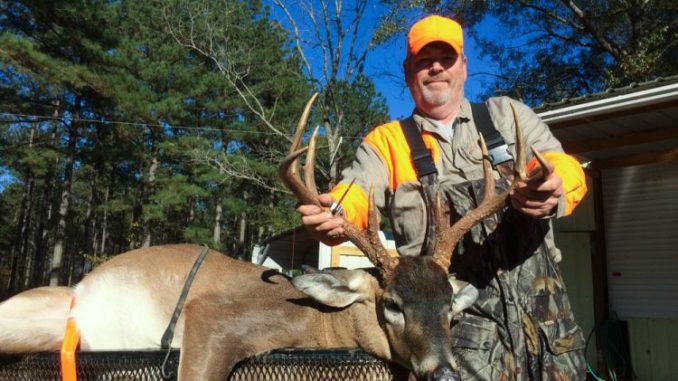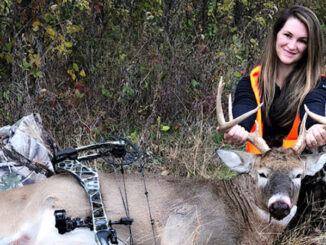
Great info on finding the right fit if you’re looking to join a deer camp this fall.
You’ve dreamed about it — a private sanctuary loaded with trophy deer, abundant food plots, all-weather stands, improved roads, a beautiful lodge and a great group of friends and family to share it with.
Could this ever really be your reality?
For many hunters, it might seem like an impossible dream, but take heart; it could happen — if you want to be part of the club.
Finding a great place to hunt is always a challenge. Unless you are independently wealthy or have family-owned land, you will probably have to either hunt public land or combine resources with others to lease property. That normally means becoming a member of a hunting club.
The decision to join a club is not one to take lightly. It could be a dream come true — or your worst nightmare.
Those who aren’t willing to put much effort in selecting a club are often disappointed, and wind up “club hopping,” never quite finding a situation they like.
But those who take the time and effort may very well find what they’ve always wanted in a hunting club: friendships and memories that last a lifetime.
Here are some tips to help you find your match:
Clubs come in many varieties
Clubs come in all shapes and sizes, from an informal arrangement with just a few hunters on small acreage to large clubs with as many as 100 members, and formal articles of organization and by-laws. Some clubs are strictly managed for serious trophy hunting, while others are managed for maximum harvest. Many clubs are geared toward family participation; others are intended as an “adults-only getaway.” Dues for clubs can vary from several hundred dollars to several thousand.
It is very important to understand what’s important to you, and then to seek a club that fits your hunting style and personality.
What do you want?
Before you start looking for a club, evaluate exactly what you are looking for. Some of the questions you might ask yourself are: How far am I willing to travel from home? What size club would suit me best? Do I want a lot of acreage and members, or a smaller venue with less pressure? What can I afford? Does the club have lodging, or will I have to supply my own? What are the values and ethics of other club members, and are their hunting styles similar to mine? Is this a family-oriented club, or is it a men’s social club? Does the club allow guests and business entertainment? How is the club run, and what forms of governance and leadership are in place?
Finding the right fit
Once you have an idea of what type of club is best for you, the process of finding that club may not be easy — and could take some time. In my experience, the best way to find a club is by word of mouth or networking. (It is possible to find a club through a classified ad, but your chances of finding a good fit are much better if you have some inside knowledge.)
The first step is putting the word out that you are looking to join a club, including a general description of what you are looking for, such as location, size and annual dues.
You can put the word out to your hunting friends on social media, as well as contacts you have at work, church and through other organizations. If you ask someone and they don’t know of any opportunities, always ask if they know anyone else who might be able to help — and always follow up. You might be surprised how quickly you find opportunities.
Once you have the name of a contact for a club, you should have someone introduce you to the person, using a ‘soft approach.’ Hunting clubs are sometimes leery of ‘strangers’ inquiring about membership. Simply explain how you found their club, and the reasons you’re interested.
Also explain that you understand they may not have an opening at the moment, but that you would like to be considered if one becomes available in the future. Emphasize that you are interested in a long-term hunting arrangement. Try to set up a time to visit the club and meet with the person in charge, or ask to attend a club meeting. Better yet, ask if you can help out on a workday.
One of the best ways to find a club is to go there as a guest. This allows you to see the property and learn more about the club and its members. It also allows others to meet you, so that when a membership does become available, the members are more likely to invite you to join.
Leadership is key
The most common reason for members leaving hunting clubs is poor leadership. I am sure you have heard about, or maybe even experienced, both extremes in leadership style.
They range from a total lack of authority, where chaos reigns supreme, to an ‘iron fist dictatorship,’ where there is so much overreach that it’s almost impossible to have fun.
Like most things, somewhere in the middle is usually best.
Some clubs operate where members are ‘permit holders.’ The rules are already set, and there are no voting rights. Provided the rules are fairly enforced, this type of organization has the advantage of strong leadership, with members knowing exactly what is expected. The disadvantage here is that members don’t have much, or any, say in how the club is run.
Most clubs use some type of democratic organization, where members elect club leaders and vote on rules and major decisions. In this type of organization, there are normally one or two people who run the club and handle most of the duties, such as dealing with landowners, enforcing rules, collecting dues, organizing workdays and paying expenses.
Running a club is not an easy task, and there will always be members who ‘know better’ and criticize decisions. Clubs should carefully select even-tempered leaders who have the time to properly run the club.
If leadership fails, the club fails.
Seasoned advice
Mark Hartman is the president of a deer hunting club in East Feliciana Parish that leases about 1,000 acres of land and has about 30 deer stands. Involved in hunting clubs since he was 7 years old, he has been in a leadership role for the past 12 years. He has seen and experienced quite a bit over the years, and was happy to share his advice.
When asked what the most important element of a successful club is, Hartman responded, “It’s all about the members and how they mesh. I believe everyone needs to respect one another, and the rules should apply to everyone in the club. I feel that everyone has to be a good listener, and all members should be involved.”
When asked what the most challenging aspect of running a club was, Hartman said, “Dealing with all the different personalities of the members and sorting out what is important and what is not. And making sure that the landowners are happy with you and your members.”
His advice to those looking to find a club?
“Ask how long the club has been on the property, the length of the lease, and how many bucks have been harvested over the last three years.”
Hartman also suggested that prospective members get a copy of the club rules and find out how the club hunts, such as private versus club stands, and whether the club is on a management program.
He also advised prospective members on potential mistakes they might make when selecting a club.
“Don’t select a club strictly based on price, and make sure the club has good leadership,” Hartman said. “Watch out for clubs that have members all over the woods who hunt everyday. This can really hurt your chances if you have a limited time to hunt.”


